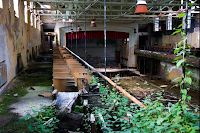
Looking back is dangerous.
In Greek mythology, the musician Orpheus sings open the gates of hell to save his wife Eurydice, only to kill her again, accidentally, by looking back at her before she'd made it back to the land of the living.
Genesis 19 tells us that, after escaping Sodom and Gomorrah, Lot's (nameless) wife "looked back at the calamity of the city" and was turned into a pillar of salt.
Contemporary feminist scholarship has been particularly involved in unveiling the inherent power dynamics of looking. Vision is, for humans, the sense that travels the farthest. To touch or taste something, the body must make physical contact. Smelling and hearing reach farther away from the self. But sight can travel miles on a clear day. With distance comes the illusion of perspective. In that empty space between seer and seen, power relations rush in to fill the void.
The notion of "The Gaze" as having the power to affect the subjectivity of both the viewer and the viewed was brought into critical discourse by psychoanalyst Jacques Lacan. Feminist film theorist Laura Mulvey introduced the notion of "The Male Gaze" in cinema to describe the way that the audience, regardless of sex/gender/orientation, is catapulted into the subject position of the straight male viewer who has mastery over the fetished female bodies onscreen. This male gaze also functions outside the movie theatre, dangerously coding "woman as image, man as bearer of the look" (Mulvey,1975).
Feminist art historian Griselda Pollock, citing the Orpheus and Eurydice story, describes the "Orphic gaze" as a potentially dangerous way of looking at photographs of past traumas that were not your own. Debate has arisen around the potentially Orphic quality of "looking back" at holocaust photography, pictures of dead U.S. soldiers in the New York Times, as well as the notorious photographs of Abu Ghraib. Why do we want to look? What do we gain from looking? Who might suffer? The line between witnessing and fetishizing can be so thin. How can we avoid "the backwards look that kills again?" (Pollock, 1996a)
Unlike Orpheus, who kills another, the glance of Lot's wife is a suicidal glance that brings her own body to a sudden halt while others move onwards without her. She decides to take a moment -- ever-so-briefly! --to witness and mourn the past, and in so doing her body is frozen forever in the gesture of that single choice.
If I were to theorize "The Glance of Lot's Wife," I would describe it as the calcifying pain that the minoritarian subject feels when she looks back at the long history of oppression against people who look and feel and act like her. The dawning awareness of the past's heaviness can be immobilizing. The attempt to bear witness to shared trauma can leave you unable to see or feel anything other than that trauma's endless aftermath.
I sometimes feel like this, feet and form stuck in place, salty tears running down my hard, salty cheeks. I can't give up my backward glances, yet neither can I give up my gaze towards the distant horizon. I guess that leaves me shuffling forward, trying not to trip over my feet.









